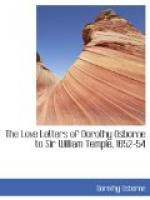Letter 53.—Dorothy’s brother seems to have got hold of a new weapon of attack in Temple’s religious opinions, which might have led to a strategic success in more skilful hands. He only manages to exasperate Dorothy with himself, not with Temple. As for Temple, he has not altogether escaped the censure of the orthodox. Gossiping Bishop Burnet, in one of his more ill-natured passages, tells us that Temple was an Epicurean, thinking religion to be fit only for the mob, and a corrupter of all that came near him. Unkind words these, with just, perhaps, those dregs of truth in them which make gossip so hard to bear patiently. Was it true, as Courtenay thinks, that jealousy of King William’s attachment to Temple disturbed the episcopal equipoise of soul, rendering his Lordship slanderous, even a backbiter?
Robin C. is probably one of the Cheeke family.
Bagshawe is Edward Bagshawe the Elder, B.A. of Brasenose, Oxford, and of the Middle Temple, barrister-at-law. In the early part of the century he had been a Puritan among Puritans, and in the old hall of the Middle Temple had delivered two lectures to show that bishops may not meddle in civil affairs, and that a Parliament may be held without bishops; questions still unsettled. Laud appears to have prohibited these lectures. Bagshawe in after life joined the King at Oxford, and suffered imprisonment at the hands of his former friends in the King’s Bench Prison from 1644 to 1646. Young Sir Harry Yelverton, Lady Ruthin’s husband, broke a theological lance with his son, the younger Edward Bagshawe, to vindicate the cause of the Church of England. The elder Bagshawe died in 1662, and was buried at Morton Pinckney, in Northamptonshire. How and why he railed at love and marriage it is impossible now to know. Edward Bagshawe the younger published in 1671 an Antidote against Mr. Baxter’s Treatise of Love and Marriage.
The preaching woman at Somerset House was, in all probability, Mrs. Hannah Trupnel. She, that in April of this year is spoken of, in an old news-book, as having “lately acted her part in a trance so many days at Whitehall.” She appears to have been full of mystical, anti-Puritan prophecies, and was indicted in Cornwall as a rogue and vagabond, convicted and bound over in recognizances to behave herself in future. After this she abandoned her design of passing from county to county disaffecting the people with her prophecies, and we hear no more of her.
SIR,—’Tis well you have given over your reproaches; I can allow you to tell me of my faults kindly and like a friend. Possibly it is a weakness in me to aim at the world’s esteem, as if I could not be happy without it; but there are certain things that custom has made almost of absolute necessity, and reputation I take to be one of these. If one could be invisible I should choose that; but since all people are seen or known, and shall be talked of in spite of their teeth, who is it that does not




